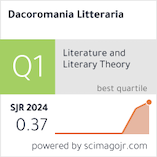Guillaume Brie
SOIGNER ET PUNIR. UNE FICTION LITTÉRAIRE DE SAMUEL BUTLER COMME GRILLE DE LECTURE CRITIQUE DU TRAITEMENT PSYCHO-MORAL DES DÉLINQUANTS SEXUELS AUJOURD’HUI
DOI: https://doi.org/10.33993/dlr.2018.5.82.91
Author's coordinates: 440 Avenue Michel Serres, 47916 Agen, France.
Email: Guillaume.Brie@justice.fr
CARRIING AND PUNISHING
(Abstract)
In Erewhon, a critical counter-utopia of the Victorian society of his time, the writer Samuel Butler describes a society in which disease is condemned as a crime, and crime treated as a disease. The author offers a heuristic reflection on individual responsibility and its uses in the government of crime or illness. Drawing both from this literary - and especially political - example and from an empirical research in sociology focused, among other things, in the medical care of pedophiles, this paper questions the way in which convicted sex offenders are incited by the justice system to present their deviance as a moral fault while acting in control of themselves and their drive. Within the systems designed to treat conduct disorders, sex offenders must remain the most authentic to themselves otherwise they will not benefit from any sentence adjustment. To do this, these systems intend to develop their feeling of self-efficacy, their self-confidence, the ability to communicate, their empathy. To carry out these therapeutic mediations, are used, for example, psycho-corporal techniques inspired by psychodrama, relaxation but also sports practice to explore the relation to the body, etc. This injunction to work on oneself is also an opportunity for the therapist to exercise a biographical supervision of the convicted person. Thus, is at stake in these systems a power with both subjugation and subjectivation impacts – a paradoxical process if any – whose political dimension must be analyzed. Referred to his affects in a totally depoliticized dimension, the convicted sex offender is in fact caught up in technologies of power ignored as such which annihilate any possibility of resistance.
Keywords: knowledge/ power, accountability, biographical monitoring, sexual crimes.
A ÎNGRIJI ȘI A PEDEPSI
(Rezumat)
În Erewhon, o contrautopie critică a societăţii victoriene a timpului său, scriitorul Samuel Butler descrie o societate în care boala este condamnată ca crimă, iar crima tratată ca boală. Autorul oferă o reflecţie euristică asupra responsabilităţii individuale şi a utilizării sale într-un guvern al crimei şi al bolii. Conceput atât pe baza acestui exemplu, literar şi, mai ales, politic, cât şi printr-o cercetare empirică în sociologie, axată, printre altele, pe îngrijirea medicală acordată pedofililor, studiul de faţă investighează modul în care persoanele condamnate pentru delicte sexuale sunt îndemnate de către sistemul judiciar să-şi trateze înclinaţia deviantă ca pe o greşeală morală şi să apeleze la autocontrol, prin reprimarea acestor impulsuri. În cadrul structurilor care se ocupă de diverse tulburări, delincvenţii sexuali trebuie să rămână cât mai autentici, mai sinceri, riscând, în caz contrar, să nu mai poată beneficia de vreo reducere a pedepsei. În acest scop, li se induc sentimente de autoeficacitate, de încredere în sine, li se dezvoltă abilitatea de a comunica şi empatia. În vederea acestei medieri terapeutice, sunt utilizate, de pildă, tehnici psiho-corporale inspirate din psihodramă, tehnici de relaxare şi practici sportive pentru explorarea relaţiei cu propriul corp etc. Necesitatea de a lucra cu propriul corp reprezintă şi pentru terapeut o oportunitate de a-l supravegherea pe condamnat din punct de vedere biologic. Astfel, miza acestor sisteme este o putere cu un impact atât coercitiv, cât şi de subiectiv, un posibil proces paradoxal a cărui dimensiune politică se cere analizată. Analizat prin prisma afectelor sale, într-o dimensiune total depolitizată, delincventul sexual este, de fapt, prins în tehnologiile puterii şi ignorat, fără posibilitatea de a se opune.
Cuvinte-cheie: cunoaştere/putere, responsabilitate, monitorizare biografică, delicte sexuale.


